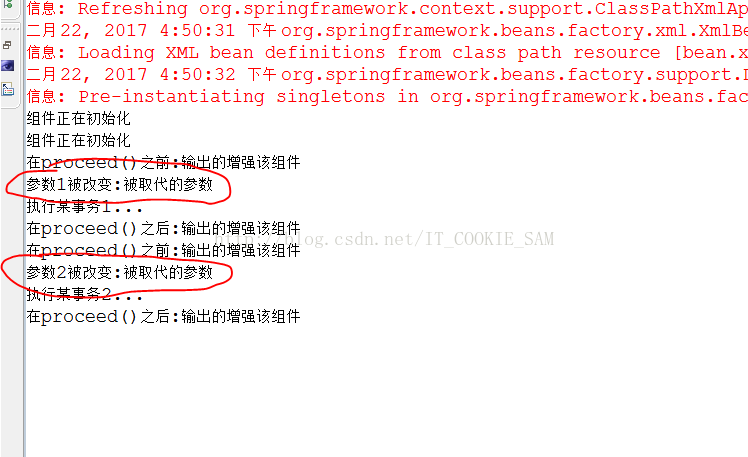@around增强(也称通知)
概念:@around是一个介于@after和@before之间的注解,所以有人说around十分强大(为什么这么说?)因为以下三点
1.有人说他可以完全阻止目标方法执行,实际上是不写proceedindjoinpoint参数的proceed()就可以达成了,其实proceed()方法是在around注解中执行目标方法的关键词.
2.另外有人说around可以自己选择目标方法什么时候执行,实际上是通过proceed()方法,然后把增强方法放于proceed()前后就可以决定在proceed()之前执行还是之后执行.
3.另外还有人说他可以共享某种资源,其实际也是因为该proceed()里面塞入参数,该参数被所有目标的带参方法所用(同时也覆盖了带参方法本身的参数)
看上面的around简介还是不知道我在说什么?没关系,请看代码!
组件类
package test;
import org.springframework.stereotype.Component;
@Component
public class component {
public component() {
System.out.println("组件正在初始化");
}
public void test() {
System.out.println("执行某事务...");
}
}
切面类
import org.aspectj.lang.ProceedingJoinPoint;
import org.aspectj.lang.annotation.Around;
import org.aspectj.lang.annotation.Aspect;
@Aspect
public class aspect {
@Around("execution(* test.*.*(..))")
private void test(ProceedingJoinPoint pj) throws Throwable {
System.out.println("在proceed()之前:输出的增强该组件");
pj.proceed();
System.out.println("在proceed()之后:输出的增强该组件");
}
}
配置
xmlns:context="http://www.springframework.org/schema/context"
xmlns:aop="http://www.springframework.org/schema/aop"
xsi:schemaLocation="
http://www.springframework.org/schema/beans
http://www.springframework.org/schema/beans/spring-beans.xsd
http://www.springframework.org/schema/context
http://www.springframework.org/schema/context/spring-context-2.5.xsd
http://www.springframework.org/schema/aop
http://www.springframework.org/schema/aop/spring-aop-2.5.xsd
">
运行类
import org.aspectj.lang.annotation.Aspect;
import org.springframework.context.ApplicationContext;
import org.springframework.context.support.ClassPathXmlApplicationContext;
public class ac {
public static void main(String[] args) {
ApplicationContext ac=new ClassPathXmlApplicationContext("bean.xml");
component com=ac.getBean(component.class);
com.test();
}
}
前面的这段代码足以说明1,2点,代码必须自己细细品尝才得出真知的,所以我不多说什么了.
第三种:执行方法前后共享某个状态的数据.即向proceed()里面放入一串字符串
这时候我的组件类改成带参的方法,并且多增加一个方法
@Component
public class component {
public component() {
System.out.println("组件正在初始化");
}
public void test(String name1) {
System.out.println("参数1被改变:"+name1);
System.out.println("执行某事务1...");
}
public void test1(String name2) {
System.out.println("参数2被改变:"+name2);
System.out.println("执行某事务2...");
}
}
运行类
public class ac {
public static void main(String[] args) {
ApplicationContext ac=new ClassPathXmlApplicationContext("bean.xml");
component com=ac.getBean(component.class);
com.test("1");
com.test1("2");
System.out.println();
}
}
红色部分是本来的形参
但是你看看结果
本来要输出1和2的现在都被一个数组给被替代了(这就是他们口中称的目标方法执行前后共享某种状态的数据)
今天学习around到此为止


